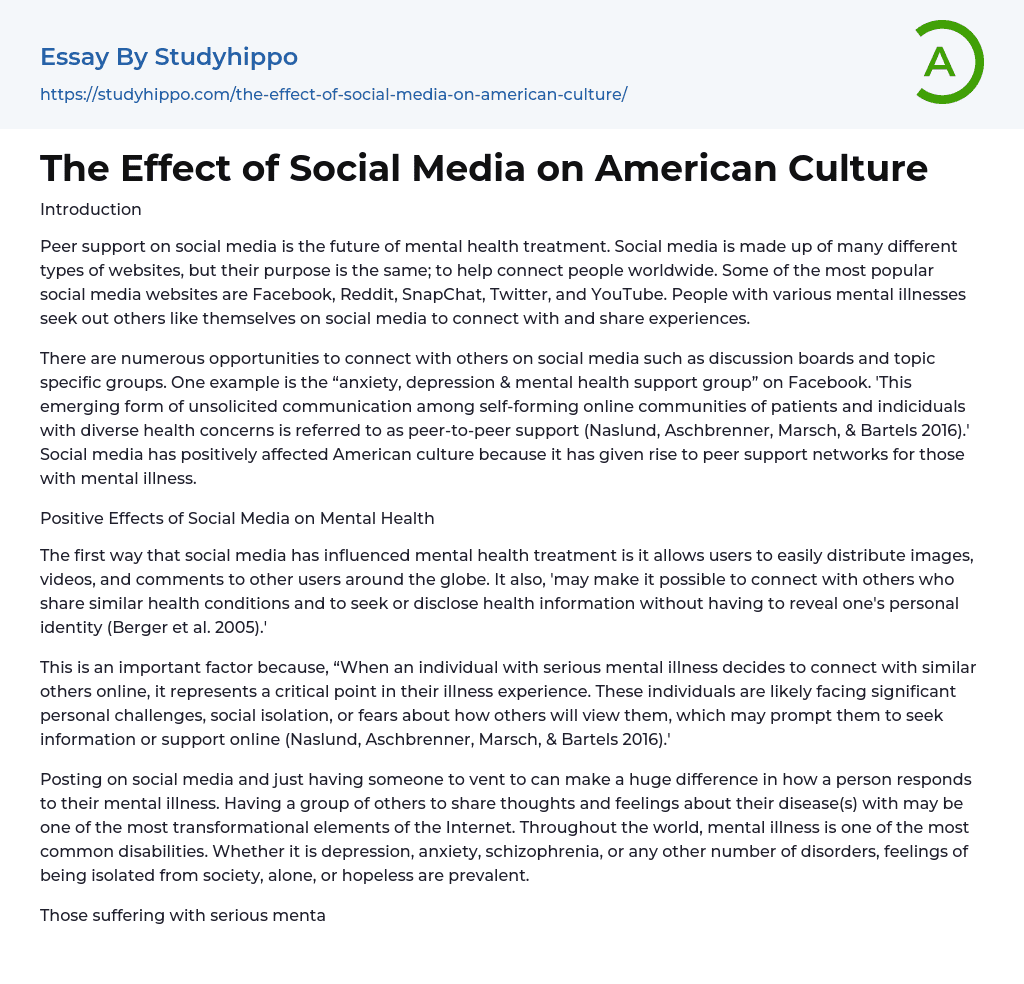

The Effect of Social Media on American Culture Essay Example
Introduction
Peer support for mental health treatment is becoming increasingly popular on social media platforms.
Various types of websites comprise social media, with the common goal of connecting people worldwide. Prominent examples of social media platforms encompass Facebook, Reddit, SnapChat, Twitter, and YouTube. People with various mental illnesses utilize social media to discover and connect with others who share similar experiences. Social media provides diverse opportunities for connecting with others through features such as discussion boards and specialized groups.
The Facebook support group called "anxiety, depression & mental health support group" is an example of a peer-to-peer support community on social media that has had a positive impact on American culture (Naslund, Aschbrenner, Marsch, and Bartels, 2016). These online communities allow people with various health concerns to connect and provide unsolicited support. They hav
...e become a new means of communication for those seeking help with their mental health.
Social media has positive effects on mental health by providing a platform for users to share images, videos, and comments about mental health treatment globally. It also allows individuals to connect with others who have similar conditions without revealing personal information (Berger et al., 2005). This anonymity is crucial for those who may be facing challenges or fears regarding judgment and isolation. Seeking information or support online can be a turning point in their experience with illness.
Posting on social media and having someone to talk to can significantly impact how individuals respond to their mental illness.
The Internet has revolutionized the way people with mental illnesses connect and share their experiences. Mental illness is a widespread global disability that includes conditions like depression, anxiety, schizophrenia, and other disorders. It often lead
to feelings of isolation, loneliness, and hopelessness. Additionally, individuals with severe mental illnesses are more prone to substance abuse. Therefore, it is essential to ensure accessibility of all resources for this particular group.
Connecting with others who have mental illnesses through platforms like Facebook or YouTube can help individuals feel less isolated and more accepted. Social media is particularly popular among young adults who are going through important developmental tasks, such as figuring out their identity and fitting into society (Primack & Escobar-Viera, 2017). It's important to address mental health problems early on for better outcomes, just like any other health issue. Dealing with mental illnesses alone is extremely difficult, and having a strong support network can significantly improve results.
The Negative Impact of Social Media on Mental Health
According to Primack & Escobar-Viera (2017), social media (SM) can create a unique kind of peer pressure by emphasizing the importance of presenting oneself during adolescence. Additionally, using social media may lead to increased multitasking, which has been linked to negative cognitive and mental health effects. Some studies have even found a connection between excessive social media use and higher levels of aggression, as well as reduced empathy towards pain and suffering. Relying solely on social media for social interactions can worsen feelings of loneliness and isolation compared to traditional relationships.
'Online interactions with peers can generally have a positive influence, although it is possible to find online forums that promote self-harm and other destructive behaviors (Ziebland ; Wyke, 2012).'
Conclusion
Individuals with mental illnesses often experience low self-esteem, and connecting with others in similar situations can be extremely beneficial. Not all websites or forums categorized
as social media provide positive influences. When used appropriately, social media can serve as a valuable source of emotional support for those struggling with mental illnesses.
References
- Fergie, G., Hunt, K., Hilton, S. (2016, Dec). Social media as a space for support: Young adults' perspectives on producing and consuming user-generated content about diabetes and mental health. Retrieved from https://www-sciencedirect-com.ezproxy.liberty.edu/science/article/pii/S0277953616305652
- Naslund, J., Grande, S., Aschbrenner, K., & Elwyn, G. (2014, Oct). Naturally Occurring Peer Support Through Social Media: The Experiences of Individuals With Severe Mental Illness Using YouTube. Retrieved from https://search-proquest-com.ezproxy.liberty.edu/docview/1612298035?pq-origsite=summon&accountid=12085
- Naslund, J., Aschbrenner, K., Marsch, L., & Bartels, S.
(2016, Apr). The Future Of Mental Health Care: Peer-To-Peer Support And Social Media. Retrieved from https://www.cambridge.org/core/journals/epidemiology-and-psychiatric-sciences/article/future-of-mental-health-care-peertopeer-support-and-social-media/DC0FB362B67DF2A48D42D487ED07C783/core-reader#,
The article titled "Social Media As It Interfaces With Psychosocial Development And Mental Illness In Transitional Age Youth" can be found on the website: https://www-sciencedirect-com.ezproxy.liberty.edu/science/article/pii/S1056499316301201.



